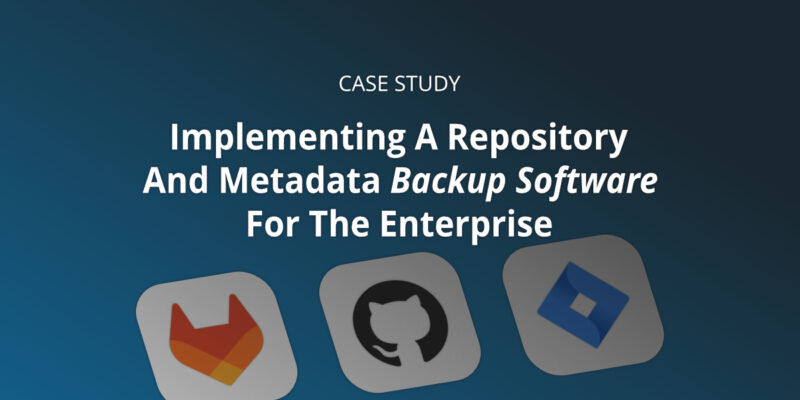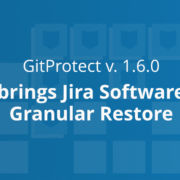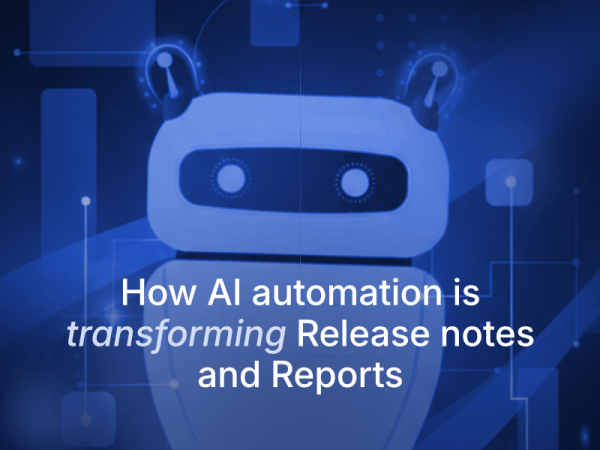
Implementing A Repository And Metadata Backup Software For The Enterprise – A Case Study
This article will shed light on the approach followed by one of GitProtect.io’s enterprise customers to increase its security and data accessibility and availability in case of data loss. Test a backup solution for free during a 14-day trial period.
Repository and metadata backup is still a niche, although incredibly important when we speak about source code as Intellectual Property and one of the most valuable assets owned by a tech-related company. Fortunately, there is a growing awareness of the need to secure data produced by DevOps, popularized through cloud Shared Responsibility Models, and security certifications or standards (just to mention SOC 2 or ISO 27001) that require having all data reliably backed up and protected.
The background of the story
The quick overview of the company’s infrastructure
GitProtect.io partnered with a digital entertainment company whose entire products’ source code is hosted within DevOps tools. The company operates globally, serving customers worldwide. They have a rather complicated infrastructure with offices and developers spread in different countries. Due to its multinationality and the possibilities of the regions, they operate their development on two different repository hosting platforms – GitHub and GitLab.
Having constant, uninterrupted access to those data and ensuring the recoverability of both repositories and even more – to related metadata – became company idée fixe. Otherwise, any data breach, data loss, or human error (just imagine head overwrite) could result in interruptions to the company’s services, loss of reputation, loss of income, and rising costs… and, in the worst-case scenario, – bankruptcy.
Another challenge for them was to find software that could support repositories both in the US and EU regions where the company has its offices.
Why do they need a backup?
The security team understood from the very beginning all the risks connected with losing or revealing their source code. That is why they tried to do their best to succeed in it. First, they delegated writing the scripts to back up their metadata to a few DevOps team members. Initially, it seemed convenient, but with the development and growth of the company, and the increased the number of products they provide to their customers, it became an administrative and management burden.
Another issue was their security. As their scripts provide only backup, there was no assurance that their data wouldn’t be intercepted. The security team began to look for solutions that could ensure encryption, data immutability, and additional ransomware protection features.
Moreover, as they used scripts to back up their data, they also needed some scripts to recover their data in case of a failure, as well. Actually, it was one of the reasons why they started looking for a professional backup solution. They knew that if any of their scripts failed, they could lose both the month-/years-work of developers and the entire project.
The last thing was storage. Due to the fact that they had previous backup experience and, consequently, had their own AWS S3 storage, they needed a backup solution that would permit them to keep their own cloud and, eventually, provide some other cloud storage space for replication purposes.
The reasons to back up GitHub and GitLab repositories and metadata
Having understood that backup scripts don’t work as they expected, the company started to look for an advanced solution. As it turned out, there are not many backup companies that take responsibility for backing up Git repositories and metadata, especially to both platforms – GitLab and GitHub in one management console. What is more, having a rather complicated infrastructure and such little information on the issue, it was difficult for them to find a perfect match. Usually, backup vendors offer backup and recovery possibilities only to protect one repository platform. A more complex solution was presented only in GitProtect.io’s backup portfolio.
For the company, it was convenient to back up all their numerous repositories and metadata with one single solution. Actually, GitProtect.io turned out to be a unique vendor that offered to back up both GitLab and GitHub repos and metadata. Another advantage was that the backup vendor also gave a possibility to back up Jira – all in one case. Some of the company’s offices used Jira to set up and monitor the projects and tasks. Thus, outages for such offices meant some hours out of work.
The advanced backup and recovery in action
No – failure, yes – backup
GitProtect.io has backup protection in its DNA, thus, when the company looked through the possibilities the backup vendor provides, they dived into the proof-of-concept process. The solution fully met their requirements for entire protection.
First, the backup company offered the opportunity to backup repositories to different locations (the EU and US data centers), and it wasn’t a problem for them to back up metadata from different locations, as well.
Automated, policy-based backups were another reason in favor of GitProtect.io, as it greatly reduced the time the DevSecOps team spent on writing the scripts for backup. It turned out to be absolutely effortless to set backup policies and monitor them. GFS (Grandfather-Father-Son) was an excellent model that permitted them to fulfill their backup requirements for having peace of mind that they could restore their data from any point in time.
Then, it was encryption. GitProtect.io allows them to encrypt their data in-flight and at rest with the AES 256 algorithm that’s considered unbreakable. Moreover, it was convenient for them to make their own encryption key – as source code security is their first priority.
Next, on the scales was the storage. GitProtect.io left a choice for them – to back up to their own AWS S3 cloud, to any on-premise data store, or to use unlimited cloud storage included. Due to the fact that leaving their own storage was one of their criteria while looking for a backup, of course, the first option was their intention. However, they didn’t exclude the possibility of backup replication to the included unlimited cloud storage to strengthen their data resilience confidence.
Recovery gives data zero loss
Recovery possibilities became another trigger to stop the company’s eye on GitPotect.io. With its wide range of backup possibilities, including the 3-2-1 backup rule (at least 3 copies, 2 storages, 1 offsite), it promises to make the recovery process easy and instant. With multiple recovery models.
The client’s main motive was the ability to efficiently restore all data in the event of a serious failure or long unavailability of GitHub or GitLab (such as the major one that affected Jira in April 2022). While comparing Disaster Recovery technologies, the customer assured us of our most professional and advanced Disaster Recovery options on the market. With the bulk recovery of all data (all repositories and metadata), many restore locations (same or new account, local device), and unique cross-over recovery to another git hosting provider we broke the bank. Now, the company can be sure that it can easily restore or migrate all data between GitLab and GitHub, to ensure the SDLC processes continue in the event of a failure of one of them or restore to their local machine.
For daily operations and some unintentional human errors (mostly deletion), granular restore comes to the rescue. The company can explore copies and restore only chosen items – that got lost or deleted.
With GitProtect.io’s solution, the company got the guarantee that there would be no single hour out of work due to outages and no single point of failure. As they can restore repositories and metadata using different recovery schemes, including point-in-time, granular, and cross-over recovery.
Easy management and monitoring
The company found another bonus in implementing GitProtect’s solution – a single management console. It became a useful tool for the management to set and manage privileges and roles between their team members, including, assigning additional admins to control backup and restore processes.
It opened them an opportunity to know for sure not only when a backup is made, but also who is responsible for a copy, was the copy successful, and all the details about the performed backup from a single dashboard. Moreover, it permitted them not to lose any piece of information, due to email or Slack notifications, SLA reports, and very detailed audit logs.
Thanks to SAML integration, the security team has great control over authorization and access to the central management platform and backup settings.
Final thoughts
The adoption of GitProtect.io backup and recovery technology ultimately met all of the digital entertainment company’s goals and challenges, they managed to protect their complicated infrastructure localized in different regions with automated backups.
Easy management and monitoring permitted their DevOps team to concentrate on their core duties, ensuring that their GitHub and GitLab data was fully secured in a few storage destinations. Then, the company could have peace of mind as GitProtect.io’s Disaster Recovery Technology guarantees that all their GitHub, GitLab (and some Jira) data can be recovered from any point in time assuring data loss prevention and business continuity.
What to know more about GitProtect.io and its backup & recovery solution? Sign up for a free trial to see how the software works or even go further – and arrange a call with one of our experts.






